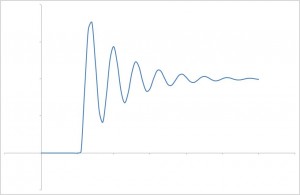The following is a short edited extract of my response in a forum to a particularly irritating denialist/climate-skeptic (note that a climate-skeptic is not a true sceptic, just a denialist in disguise).
Why am I sharing this? Well, partly to get it off my chest and out to wider audience, but also because it very succinctly explains, in my mind at least, the core elements of the climate change impact. That is, putting CO2 into the atmosphere at the rate we are doing it will cause the climate to swing wildly for a long time before it settles to a new level. It doesn’t sound that different to the way many people describe it, but, for some reason, explained in this way, at a high level, but with an engineering slant, really resonated with me (maybe because I’m an engineer)
————
Everybody ackowleges that the long term climate contains natural cycles. These cycles have been documented and studied for some time and our knowledge of them is continually improving. I’m sure that David does understand these cycles very well given the kind of work has has done in the past and in his current efforts working to predict longer term weather patterns (or very short term climate changes – depending on your point of view).
There has also been a good deal of work and understanding of the scope of CO2 emmissions, particularly anthroprogenic emmssions, and the role CO2 has on climate. Our knowledge and understanding on this aspect has also increased and we have confidence in our ability to predict the effects of changing the CO2 levels in the atmosphere.
Further, the modelling that has, and is, being done around the world has taken both these elements into account when prediciting changes in global temperatures.
There are a range of opinions about whether the anthropogenic forcing is significant or not. Many of those positions, especially those at both extremes, are based more on hope or fear than of good science. However, the modelling thus far ,clearly shows that anthroprogenic forcing is significant and will drive temperatures higher over the medium to longer term and cause more severe climate fluctuations than would otherwise occur.
If you look at the climate record you can see that it behaves as a complex underdamped system with very long settling time. The anthropogenic forcing appears essentially as a step function imposed on this underdamped system and it will cause wild oscillations for a considerable time before it settles at a new level.
I, for one, do not want to see these oscillations, as they will likely wreak havoc on the systems and environments that we rely on for survival.
If someone can show me that this is not the case and that the climate is not starting to exhibit a transient response to this forcing, then I am all ears.
To date, no one has.

“If someone can show me that this is not the case and that the climate is not starting to exhibit a transient response to this forcing, then I am all ears.”
Um before someone can show you that climate is not exhibiting a transient response to this forcing, don’t you have to first demonstrate that it already is?
Yep, and that’s what the temperature records show, a sharp rapid increase in temperature over the last several decades superimposed on the natural variations. In line with the established modelling and peer reviewed science on climate change.
“..a sharp rapid increase in temperature over the last several decades superimposed on the natural variations.”
The natural variations. You mean they can measure paleo-temperatures back thousands of years right to the 1/100th of a degree? Wow, I had no idea that tree rings and swamp crud were such accurate proxies. Fantastic. Thanks for this.
No worries! Glad I could help!
Seriously though, the data is there, as is the analysis and the subsequent conclusions. I am convinced by the data and the modelling in the peer reviewed science, and agree with the conclusions which are summarised in the IPCC reports and others.
Everyone is free to study the reports and the underlying models and data on which they are based.